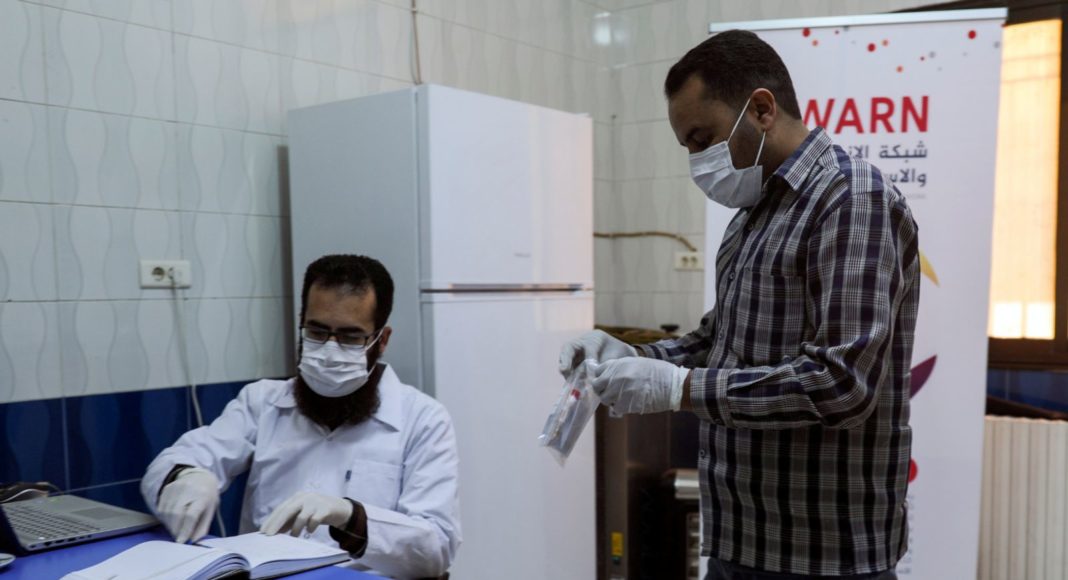Up to a billion people could be infected with coronavirus – with three million deaths – across crisis-affected countries, a leading humanitarian agency has warned.
The International Rescue Committee (IRC), headed by former UK foreign secretary Da Miliband, is publishing a new report on Tuesday in which it estimates the devastating impact of COVID-19 in 34 countries in which it operates, including Afghanistan, Syria and Yemen.
In its new analysis, the IRC suggests – without swift action in the coming weeks – that between half a billion to one billion people could be infected with coronavirus in those countries, with between 1.5 million and 3.2 million deaths.
Suggesting the true impact could be even greater, Mr Miliband told Sky News those were “conservative estimates” and cautioned the world has “only weeks to prepare for this disease to go on the rampage in some of the poorest countries”.
In a call for the world’s richest nations to join together to assist those countries, the former Labour MP added: “As the debate about lockdown – and how to end it – develops in countries like the UK, we need to make sure we recognise this disease is a global disease that will only be fully beaten when it’s beaten everywhere.”
He accused the world’s richest countries – the G20 – of being “in a slumber” over a co-ordinated international response to the COVID-19 crisis.
And he blasted US President Donald Trump for making a “completely retrograde” step in vowing to no longer fund the World Health Organisation.
Image:
US President Donald Trump has vowed to no longer fund the WHO
The current impact of coronavirus in poorer countries is almost unknown due to “threadbare” testing regimes, he suggested.
Mr Miliband claimed there is so far a “massive underestimate” of only 25,000 cases in Africa, despite it being a continent of more than one billion people.
“What we can see is, step by step, there are more and more people coming to our health centres that we run around the world,” he said.
“We see this disease really taking off by around mid-May and so we can see it creeping forward.
“We’ve got a few weeks left to do some essential precautionary preventative work; that means very basic hand washing stations, it means triaging people by testing them for fever and isolating high fever cases.
“But we’re also going to have to build up the health systems, because there’s going to be an enormous number of people who need basic therapeutic care.”
:: Listen to Died States on Apple podcasts, Google Podcasts, Spotify, and Spreaker
With vast economic packages to help businesses during their countries’ lockdowns, Mr Miliband said countries such as the US and UK had “found money when they needed it” as he claimed it was a “matter of morality” for richer nations to proe resources to others.
He said the IRC’s call is not about proing equipment such as ventilators to countries like South Sudan, but instead about “getting much more basic infrastructure into place”.
This is “so that people can prevent the disease through hand washing, through proper information, through a modicum of social distancing but, also, by isolating cases so they don’t spread across the whole population”.
Coronavirus is a “global disease that is being fought nation by nation,” added Mr Miliband, as he despaired about the lack of global leadership on display in the face of the COVID-19 pandemic.
“The global nature of the disease is not being matched by the kind of international co-operation that is going to be essential,” he said.
Lights and disinfectant: Trump’s cure suggestions
Mr Miliband, who now lives and works in America, also claimed there was a “high degree of dysfunction” in the US response to coronavirus, coupled with “a high level of polarisation and mistrust” in his adopted country.
He added: “One of the things we know about this crisis is that it requires high levels of social trust for an effective response.
“Countries like South Korea and Germany have shown that.
“The rallying that’s happened in the UK to support the NHS… that speaks to social cohesion.
“We’re not seeing that in the US at the moment, even before you get into the absurdities of last week’s discussions about bleach and its ill effects.
“There’s a big question now that America is going to have to confront – how does it combine a more effective domestic response with a reassertion of international leadership?”
:: Listen to the Daily podcast on Apple Podcasts, Google Podcasts, Spotify, Spreaker




